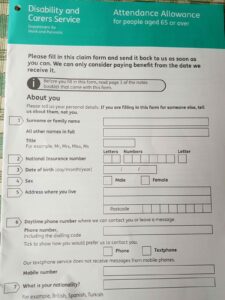According to the Health and Well being – The state of ageing 2023 -2024 since the early 1980s we have seen a huge shift in the age profile of the country.
The number of people aged 65 and over has increased by almost 50%, and there are almost three times as many people aged 85 and over as there were 40 years ago.
These trends look set to continue over the next 40 years, with the population aged 80 and over growing most rapidly
Almost three million people aged 50 and over are unpaid carers, with women in their 50s most likely to be providing unpaid care.
20% of all women aged 50-64 are unpaid carers and over 230,000 carers aged 50 and over are in bad or very bad health themselves.
Managing the care of a loved one, work, a home and family life? How can you look after yourself and your loved ones without running yourself into the ground?
ASK FOR HELP
Encouraging loved ones to accept support
I/YOU can manage! Often our loved ones won’t acknowledge the need for help or accept it, they may expect you to continue providing levels of support that are no longer possible and risk you becoming stressed or poorly and unable to carry on.
Trying to encourage someone to acknowledge that they need some help can be tricky but to help them stay at home support may be necessary and these things are worth considering if you are trying to persuade a loved one to accept help:
1. Provide solutions that allow control
2. Be empathetic
3. Accept and explain your own limits
4. Stay positive
5. Be sensitive to a possible role reversal
6. Enlist the help of professionals if necessary
7. Let them feel like they are making their own decisions
8. Allow for a smoother, slower introduction of services (providing it is safe) and build up gradually
Carer stress
Remember, helping someone to remain independent means looking after yourself, to make sure you have help, time to allow you to work, look after your own family or go out, even if it is just into the garden with a book!
Care doesn’t have to mean hands on personal care, it could be regular contact with others in a group or social setting or a service that provides practical help eg gardener/lawn mowing, window cleaner, cleaner, laundry/ironing, social calls, sitting services, shopping calls or medication reminders.
Be Kind to yourself
Don’t expect too much of yourself or worry about the things you can’t control. Keep connected with others, friends/family and groups that may be able to help or be there to listen. Don’t feel guilty or angry or ever worry that you are not good enough. You are doing your very best for the one that you love, that will always be good enough but you may need some support to be able to carry on and avoid accidents or worse injury to yourself and the person you are looking after.
Looking after yourself
Look after yourself will help you to carry on, stay independent and reduce the need for ongoing support and the risk of your situation worsening.
• Be active, move more
• Sleep well
• Eat well
• Keep hydrated – don’t stop drinking because you will need to go more
• Be sociable, feel part of something and laugh
• Learn a new skill
• Appreciate what you already have
• Volunteer to help others, get and stay connected, feel valuable and be valued
• Manage an illness well
This is a great fact sheet for encouraging and prompting self-care
Bring in the professionals
Contact the Local Authority for an assessment of the care needs and/or an assessment of the care being provided
The GP can help with a routine check up or a medication review, you may need a referral to a more specialist service for example a memory clinic, physio or consultant investigation
Get some advice and make sure you are claiming the benefits you are entitled to as these may pay for additional support
Feb 2024
#caringforcarers #benefitsforcarers





